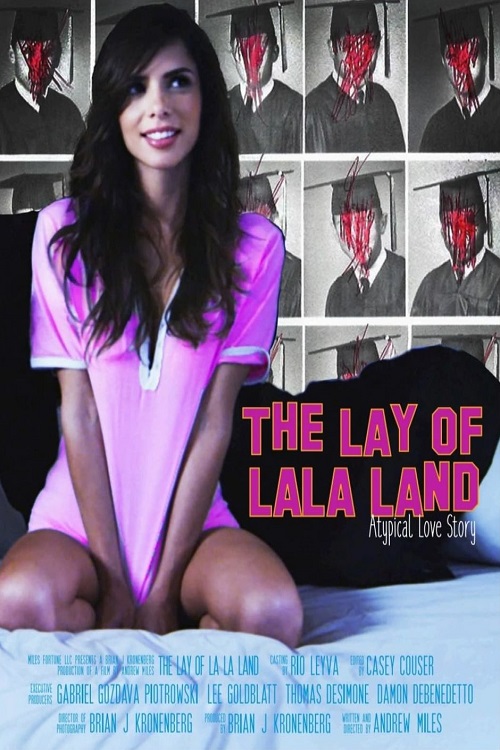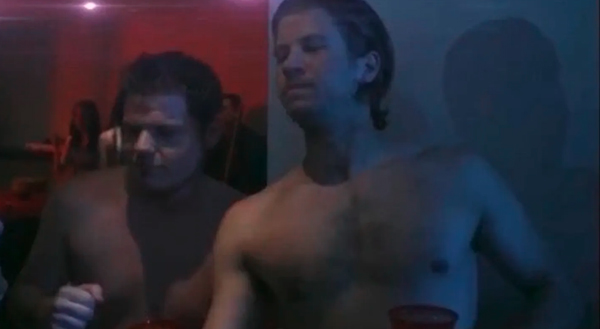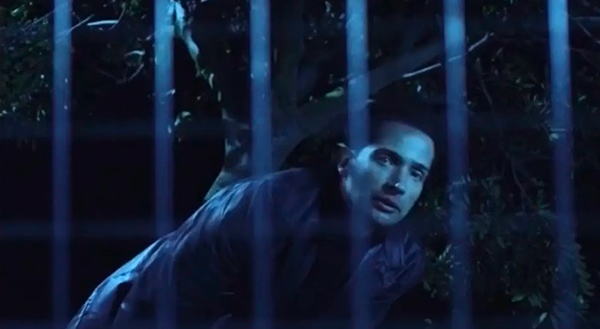The Lay of LaLa Land [2017]
Film Review
by Ethan Stamper
“A dramatic, darkly comic, but often absurdist coming of age tale about college sexual mayhem.”
-A.Y. Miles

I’ll preface this review with the fact that I went into this movie completely ignorant of the source material and unsure of what to expect. This is a rare form for me as I’m keen on being up to speed prior to viewing just for the engagement factor; I like seeing how far a film deviates from print and I’m observant of subtle changes. This film did something in true opposite day fashion. Instead of wanting to see the movie after reading the book, this film made me want to read the book. tl;dr – this film is that damn good.
The Lay of LaLa Land is a coming of age tale that is not your typical manifestation. Based on the novel of the same name from author A.Y. Miles, this indie feature film draws from true events and shells out a very sad and dark attitude over a 90-minute spell. Written and directed by Andrew Miles, the film follows Lenny Morral (David Lohnes), an insecure and inexperienced psychology major that struggles with asthma and claustrophobia as he finally meets his long-desired love-interest, Jane Gallagher (Nalita Murray), but he soon unearths a problematic reality that he struggles to comprehend.

With narration from Lenny that is present throughout, the film begins by introducing us to the childhood that cast him into the timid adult that he eventually became. His upbringing proves difficult with an abusive psychologist father that demands perfection and apparently doesn’t spare the rod for anyone, a young and beautiful stepmother that inappropriately teases him, and Lenny himself, a young teen hopped up on hormones with a nervous tick and a desire to see his stepmother in the flesh.
Making use of an improvised peeping device consisting of a mirror, broom, and tape, Lenny acts on his urge to see his stepmother in a different light. However, his plot is foiled when his father catches him in the act. After shaming Lenny for being a “peeping tom” and “sicko”, he turns his attention to his wife when he realizes she had been testing Lenny (again), hitting her. Unfortunately for Lenny, his escapades get him nothing but a 72-hour vacation in a psych ward for evaluation.
After nearly 50 hours of sessions and some prodding from the shrink, Lenny eventually begins to open up, relaying a story of being on a school trip to a pond and witnessing a horrific (and if Google is to believed, common) incident involving ducks, and his fixation on it after his classmates’ attention diverted, along with the emotions that he experienced during that moment.
Now a sophomore in college and following in his fathers footsteps in the psychology field, Lenny is very awkward and as timid as ever, as well as inexperienced with the fairer sex. Whilst at a party with his fun loving and well meaning roommates, Chet (Brent McGregor) and Warren Grock (Jonny J.), Lenny’s friend Grock bribes a lonely girl at the bar, Jane, an intelligent and beautiful woman, to make eye contact with Lenny because he is “down on his luck” in an attempt to give him a “glimmer of hope.” She abides, but takes the initiative to go a step further to introduce herself and they hit it off.

But it isn’t long before the relationship is tested when Lenny uncovers that Jane is planning to set a record in the adult entertainment world, participating in a 500 person gang bang, and bringing a new meaning to the fortune 500.
Interestingly enough, a recent topic of discussion in one of Lenny’s psychology classes centers around the connection between women in the adult entertainment industry and sexual abuse at home during childhood, planting a seed in Lenny’s brain which sprouts while accompanying Jane to visit her family, leaving him questioning whether or not Jane was abused, and by whom.
Once the dirty laundry begins to air, a complicated display of affairs soon follows that unravels tragic pasts, muddles the uncertain future, and sets the film up to end with a bang, pun intended.
Overly condensed summary that doesn’t even begin to do the film justice aside, The Lay of LaLa Land is an expedition of comedy and tragedy that stirs a variety of emotions.
From start to finish, The Lay of Lala Land doesn’t shy from darker subject matter. In fact, it brings those themes to head for confrontation for better or worse, and will leave viewers uncomfortable at times, as it should. This is a heavy film from the onset that doesn’t compromise. Abuse, suffering, romance, rebellion, etc. — this film has it all, and it is surface level all the while maintaining a humorous edge.
Given the nature of the narrative, there are obviously going to be some troubling characteristics, but none more than the realization that it is based on a true story, to some degree anyhow. It feeds you this information immediately and it marinates throughout the length of the film. It weighed on my mind as I viewed, and having this reality bleed through really heightened the presentation.
In addition, this film is a very purposeful work that will leave you connecting many dots in hindsight. For example (and without giving anything away), Lenny’s 72-hour psych session is much more pivotal to the film than it initially seems, and it later makes perfect sense why it was included in the manner it was. All around, there are many occurrences that appear to happen at random and without much thought but as the cliche goes, you’ll soon realize everything happens for a reason. The understated finesse of this is just… wow.
The script for this indie is very well written. The story is told in a steady manner that provides a good balance of humor and seriousness, even with a few flashbacks scattered in. The characters are well developed and humanized (as in relatable and interpretations grounded given their experiences), and the dialogue is clever, snappy, and tonally proper.
Moreover, the filmmakers assembled a cast that was up to the task. Nearly every actor/actress brought something to the table and was seamless in their roles, including the younger cast that turned in believable performances. But it was the starring duo of David Lohnes and Nalita Murray that made the film. David gave a convincing portrayal of an awkward and insecure college student with lingering childhood trauma, and Nalita delivered a courageous performance that was profound, troubled and valid. Furthermore, it’d be wrong not to mention the awesome performance of Daniel de Weldon with his portrayal of P. Terrence Pecker, a stereotypical slimeball with an obvious habit.

Furthermore, the runtime seemed to be optimal for what was put forward. It gives you all the essential information without too much fodder, and the film benefits from it. It isn’t uncommon for films to completely miss the mark on a runtime, whether it be intentional or a by-product of few resources, and it seems to loosen the binding, so to speak, when it is too far off.
Ultimately, The Lay of LaLa Land is a very deep and complex film that explores the mortal coil. It is a uniquely entertaining coming of age tale that is of a darker essence and not the run-of-the-mill version you’re accustomed to. At one point during his therapy session, Lenny reveals the reason his class went to the pond was to read poetry, and looking back now, that is exactly what this film is, poetry.
9 out of 10.


